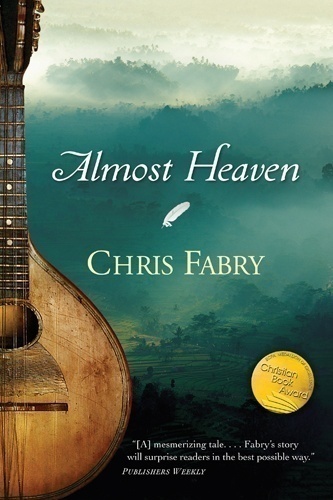 I feel like I’ve given out too many rave reviews lately (like some professor who’s only allowed to give out so many A+ marks), but here I go again. I really enjoyed Almost Heaven by Chris Fabry. I’d never heard of Fabry before reading this book, but he’s apparently a Christy-award winning author of 70 books for children and adults. He also hosts a daily radio program, Chris Fabry Live! on Moody radio, which gives him the background for this book.
I feel like I’ve given out too many rave reviews lately (like some professor who’s only allowed to give out so many A+ marks), but here I go again. I really enjoyed Almost Heaven by Chris Fabry. I’d never heard of Fabry before reading this book, but he’s apparently a Christy-award winning author of 70 books for children and adults. He also hosts a daily radio program, Chris Fabry Live! on Moody radio, which gives him the background for this book.
Billy Allman is the main character, a humble, prayerful man who begins his story at age ten. He and his family are among hundreds who lose their home when a dam at the top of the valley bursts and the valley is flooded. Billy’s family is spared—just barely—but Billy’s dad is never able to work again afterward. He has black lung from working in the mines for so long. Billy, in a way, must grow up young, taking care of first his father and then his mother (who develops mental illness).
Intersecting Billy’s story are snippets told from Malachi’s point of view. Malachi is the angel assigned to Billy, though he tells the reader, “You must know at the outset that I did not want this assignment. I did not seek it or grasp for it because at heart, I am a warrior, not a scribe.” Over the course of the story, as Malachi gets to know Billy, he slowly comes to love Billy and is even sad when he is called back to battle during a few years of Billy’s life.
Even from a young age, Billy showed great talent with the mandolin and with electronics. His dream is to start a radio station that would combine these loves. For this goal he works tirelessly, piecing together the parts he needs, slowly building his station, until finally, he goes on air. His only help is his good friend Callie, who cooks meals for him while he focuses on the station. However, when Callie gets in trouble, Billy must confront his feelings for her—and for some events hidden in his past.
I enjoyed the changing perspectives between the two narrators—the formal, almost philosophical tone of Malachi who says things like, “Humanity is not easy for a being like me to understand. In our battles, there is no acquiescence to defeat. But on that time-bound planet, the goal for the human believer is not found in every victorious triumph, but in the elusive relationship with the Father that then leads to ultimate victory”—and the simple, straight-forward storytelling of Billy.
The story also revealed new twists that kept me reading and wondering what would happen next. For example, I expected that the creation of his radio station would be the climax of the story, the thing towards which he had been working for years. Yet when he finally goes on air, it’s only the middle of the story. Unlike Screenplay, however, which felt like the story ended halfway through, this one felt like it was just beginning. There was so much more to the story than just Billy’s radio station.
At the end of the story, Fabry includes an Afterword explaining, “Good stories come from real people and real life. There is no fiction well, only people’s lives.” He talks of how he dreamed of owning and running his own radio station in the West Virginia hills, then mentions an email that he received from a listener who told him about the real Billy Allman. That idea sparked Almost Heaven, but Fabry says, “Everything in this book is from my imagination. As far as I know, there are only shadows from Billy’s real life. But I hope that in crafting this story that I have captured a little of his heart.”
Chris Fabry has a gift for storytelling just as Billy Allman has a gift for the mandolin. At the end of this book, there’s an excerpt for Fabry’s other book, June Bug, which tells the story of a minor character in this book. I’m adding that book to my list of books to find… and I suggest that you grab a Chris Fabry book too.
This book was provided for review courtesy of Glass Road Public Relations. This post contains affiliate links; as an Amazon Associate, I earn from qualifying purchases.

No Responses Yet